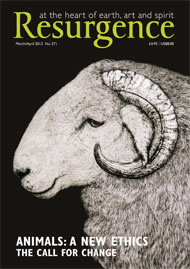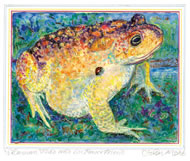What do animals want and need from us? Simply put, their manifesto is Treat us better or leave us alone.
They are fully justified in asking this of us because of who they are and because of how we treat them. Cruelty far too often defines our relationships with other animal beings. Animals want to feel safe and secure and live in peace, just like we do. The animal manifesto is a call for gentle action, and as we save other animals, we will be saving ourselves. When we listen to what animals need and want from us we can learn a lot about ourselves too.
Who lives, who dies, and why? This daunting question is central to how we choose to interact with other animals. We humans – big-brained, big-footed, arrogant and invasive mammals – are very confused about our relationships with other animal beings. We need to get over ourselves. There are too many of us and we shamelessly over-consume.
Our relationships with other animals are complicated, frustrating, ambiguous, paradoxical, and wide-ranging. When people tell me that they love animals, and then harm or kill them, I tell them I’m glad they don’t love me. We observe animals, gawk at them in wonder in circuses and zoos, experiment on them, eat them, wear them, write about them, draw and paint them, and represent them in many varied ways. And yet we often dispassionately ignore who they are and what they want and need.
We also wantonly move them from here to there as we ‘redecorate Nature’. Redecorating Nature refers to our global tendency to move into the lives and living rooms of other animals with little or no regard for what we are doing to them. We trespass and make innumerable decisions for them without their consent. Simply doing something in the name of science or education is not an adequate reason for intentionally causing suffering, pain or death, and the animals do not like our intrusions.
We are animals too and we should be aware of and proud of our membership in the animal kingdom. Arguments that ignore evolutionary relationships and continuity are bad biology and result in the establishment of false boundaries that have dire consequences for species deemed to be lower than others. British psychologist Richard Ryder first coined the word ‘speciesism’. Speciesism involves assigning different values or rights to individuals on the basis of species membership. This practice is discriminatory, ignores and fractures Nature, and constructs false boundaries among species. It puts us on a treacherous, self-serving, slippery slope that plays a significant role in misrepresenting who we are and who non-human animals are.
Speciesism also ignores individual differences within species that often are greater than the differences we observe between species. Thus, speciesism leads to specious and misleading conclusions because while some of the comparisons that are made seem to make sense and are superficially pleasing, they actually lack real merit upon close inspection. Speciesism undermines our collective efforts to make the world a better place for all beings, and we need to rethink the species interface. We also need to pay attention to what individual animals need and want, what is happening in their heads and hearts: in other words, their manifesto.
We are continually learning fascinating facts about the lives of other animals. And if we ‘deepen’ ethology (the study of animal behaviour) to include what is happening in the heads and hearts of other animals, we will learn even more. Deep ethology will implore us to mind animals and to expand our compassion footprint. Here are six reasons for doing so:
1. All animals share the Earth, and we must coexist.
2. Animals think and feel.
3. Animals have and deserve compassion.
4. Connection breeds caring; alienation breeds disrespect.
5. Our world is not compassionate to animals.
6. Acting compassionately helps all beings and our world.
How can the animal manifesto inspire us to make changes in the real and demanding world? Compassionate conservation, in which the wellbeing of individuals is given more attention by those who typically favour larger collectives such as species, populations, and ecosystems, might be the new and practical mindset that translates into meaningful action on behalf of animals. ‘Compassionate conservation’ is no longer an oxymoron, because ethics must be firmly implanted in conservation biology, even if difficult questions move us outside of our professional and personal comfort zones. We need to think and act out of the box if we are to make significant differences in how we interact with other animals. A good mandate with which to begin to enact the animal manifesto is “First do no harm to individual animals”.
We also must rewild our hearts and build corridors of compassion and coexistence so that we may all live in peace. Let’s give peace a chance, because it is obvious that our warring with other animals has not worked. The world was not created for us to use. We do not own other animals. They are not our property.
We also must teach our children, for they are the ambassadors for a more harmonious, peaceful, compassionate and gentle world. It is okay to be sentimental and to go from the heart. Students need to know this. We need more heart and love in science, and to do something that helps animals with all that we know. If we heed the animal manifesto, we will do better science and also make animals feel safer in our presence. I often imagine they are asking, “How can you do what you do to us when you know how deeply we suffer?”
We ignore and redecorate Nature in incredibly self-serving ways, as if we’re the only species that matters. It should not be all about us, but so often it is. Nonetheless, I truly believe there is hope for the future. We can make this the century of global compassion. Compassion begets compassion, and there is a synergistic relationship that includes human animals, not a trade-off, when we show compassion for animals and their homes. There is really no place like a safe home.
There are many reasons for hope. There is compelling evidence that we and other animals are born to be good and that we are natural-born optimists. We could harness our basic goodness and optimism and all work together as a united community. We can look to the animals for inspiration and evolutionary momentum. And their manifesto should keep us on track. As Nelson Mandela, played by Morgan Freeman in the movie Invictus, told the South African rugby team, we must exceed our own expectations.
So let us all self-reflect and tap into our empathic, compassionate and moral inclinations and work to make the world a better place for all beings. It is natural and “animal” to be good, compassionate, empathic and moral, and more science will not necessarily make us better or compassionate. We need to be positive and concentrate on our successes rather than dwell on anger or despair. We need to make this new social movement mainstream so that those who work for animals and the Earth are not labelled “radicals”. There are so many reasons to find beauty in our broken and wounded world.
We suffer the indignities we impose on other beings. Our guiding principles for an aspirational and inspirational global moral imperative that can catalyse a brand new paradigm should be 1. Do no intentional harm, 2. Respect all life, 3. Treat all individuals with compassion, and 4. Tread lightly when stepping into the lives of other animals.
We must treat them better or leave them alone.








